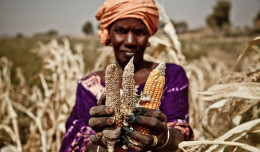 In Dakar, Senegal, thousands of children beg on the streets each day, under the guise of religious education. Plan International and UNICEF have been working to stop this practice, and now the government of Senegal is stepping in as well.
In Dakar, Senegal, thousands of children beg on the streets each day, under the guise of religious education. Plan International and UNICEF have been working to stop this practice, and now the government of Senegal is stepping in as well.
These street children, known as talibés, have been sent away from their families to attend Koranic school in the capital. A religious education is highly valued in Senegalese culture, and many legitimate schools, or daaras, exist. The problem stems from unethical daaras that traffic children in from rural areas and neighboring West African countries, and put them to work begging on the streets to earn money for the marabout, the head of the school.
Reports abound of children going hungry, living in filthy conditions, and receiving no education outside of memorizing the Koran. According to reporter Jane Labous, these children lack knowledge of fundamental subjects like math, and even the teenagers “can neither speak, read, nor write French – Senegal’s official language.”
Plan International has partnered with USAID to better conditions for talibés through the Basic Education Project. Over 100 daaras have enrolled in the program, which introduces school subjects into the curriculum, provides uniforms and materials, and improves living conditions. One goal of the project is to eventually re-enroll the children in formal school and help older teenagers find a profession.
Recently the government of Senegal has also begun to take action. In March 2013, President Macky Sall declared that all daaras that do not meet safety standards would be shut down, following a tragic fire in an overcrowded daara that killed nine children. The government is also expected to announce a new program to regulate education in these religious schools.
More measures to aid talibés have been coming from UNICEF, including a program of conditional cash transfers to help impoverished families feed their children, thus helping prevent trafficking. UNICEF is also working to identify street children in urban areas and reunite them with their families.
Creative Commons Love: Ferdinand Reus on Flickr.com

















